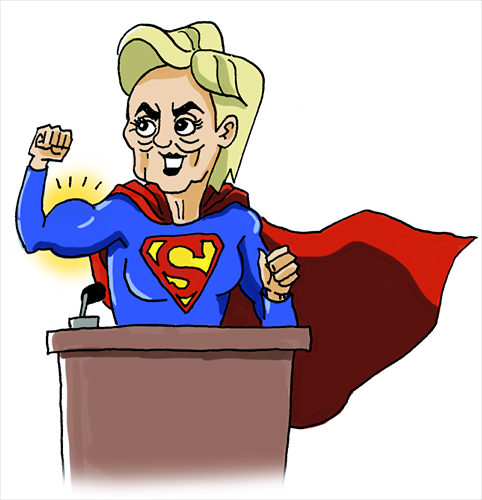HOME >> OP-ED
Clinton presidency unlikely to shake Sino-US relationship
Source:Global Times Published: 2015-4-14 22:03:01

Illustration: Liu Rui/GT
Hillary Clinton finally announced her run for the US presidency for a second time on Sunday with a two-minute video clip and push on social media, a comeback seven years after her bitter defeat to Barack Obama in Democratic nomination.Her announcement put an end to prolonged speculation about whether she would seek the candidacy as the capable and energetic politician has been active and influential in the US political arena but always denied rumors of a second presidential race.
The decision by the one-time first lady, who served as secretary of state from 2009 to 2013 and maintains hard-line stance on foreign policy, also caters to the domestic undercurrent of calling for toughness in the context of US economic recovery and jobs growth when the Obama administration has been often criticized by US observers for his weak diplomacy.
In 2008 Clinton's highly anticipated nomination of the Democratic Party was at last overtaken by Obama in one of the most contested primaries ever. Now she comes back with more political experiences and capital, but is older, which may not appeal to voters seeking freshness.
Nonetheless, she faces only a slight possibility of effective competition in the Democratic primaries this time with her credentials and powerful support of her former president husband. Even Obama endorsed her bid, saying she "would be an excellent president."
But it remains hard to predict a winner of the presidential election given the serious Republican candidates who have entered the race or are exploring a run, such as Jeb Bush, son and brother of two presidents, and Florida Senator Marco Rubio.
Clinton's hard-line stance on China and other foreign affairs, which is largely designed to woo voters, has aroused many concerns about the China-US relations once she is elected to the White House in 2016. Her unfavorable opinion about China is easy to see as she often criticizes China's human rights record.
Clinton outlined the US rebalancing strategy to the Asia-Pacific region to share the robust economic growth by local powerhouses and compete for bigger clout in the region. The US has almost exhausted possible measures like strengthening alliances and getting involved in various regional disputes, but its moves haven't turned out to be desirable as expected.
Given the rising weight of Asia-Pacific region in the international affairs, Clinton will continue to press ahead with the US pivot to Asia policy, although an array of serious issues such as the Islamic State also requires diversion of US energy. In this respect it is likely that frictions between China and the US will grow, yet the boundary of no conflict or confrontation will be guarded.
Clinton's abundant experiences in working with China enable her to have a comprehensive understanding of the complexity of the relationship between the two largest economies in the world and China's importance to the US. This can be seen in her memoir, in which she shows straightforward dislike on many international issues but refrains from being too blunt on China.
With China's rise, Clinton will likely play a tougher card than Obama if she is elected president, but she will take on a flexible attitude to adjust her China policy according to international situation and keep the most important bilateral relationship on the track of both cooperation and competition. No dramatic changes would happen in China-US relations.
Attention should also be paid to the US response to the new type of major-power relationship. Clinton has contributed to advancing the China-proposed notion and said that China and the US cannot repeat what usually happens between an emerging power and an established one. But we will have to wait and see what happens to the relationship if she wins the presidency.
The article was compiled by Global Times reporter Sun Xiaobo based on an interview with Ni Feng, deputy director of the Institute of American Studies at the Chinese Academy of Social Sciences. sunxiaobo@globaltimes.com.cn
Posted in: Viewpoint